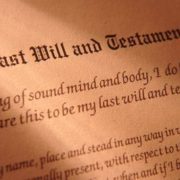Leaving a Legacy While Saving on Taxes Through Charitable Gifting
/in Estate Planning /by Dan BaronLeaving a legacy to charity is a great way to support your community, make an impact, and save on taxes. There are many charitable estate planning strategies to consider and each one comes with a careful consideration. Who you’re donating to, your financial goals, the type of asset you’re donating, tax objectives, and amount of control are just a few of the many considerations every charitable estate plan must contemplate. Using the following strategies, you can design and implement a comprehensive plan.
First, Don’t Do This…
Do not name a charity as the beneficiary of a retirement or bank account. Simply do not do this! Since big banks and financial institutions can only generate revenue based on the assets under their management, they don’t always have your best interest in mind if they lose that revenue in bequeathing your estate to your selected charity. Leaving your wealth to a stranger at a mega-corporation can cause delay and there’s no guarantee your wishes are met. Instead, it’s best to have a trusted estate “quarterback,” a.k.a. an executor and/or trustee who will ensure your plan is properly administrated. You can name your children, sibling, attorney, or trusted friend. Pick someone you trust as opposed to letting the bank pick a stranger.
Donating Through Your Will
A last will and testament is one method of donating to charities; however, it is the least efficient and most time-consuming. This option is better than naming a charity as a beneficiary of a retirement account, however, because here you at least have an executor overseeing and administering the estate. You can specify certain dollar amounts (e.g., $10,000 to XYZ church) or percentages (e.g., 10% to XYZ Church), within your will and both methods would allow your charitable beneficiaries to receive their bequest. Keep in mind that your last will does not avoid probate. Moreover, any debts against the estate would be paid first through the probate process, reducing the amount of the bequest. Nonetheless, this method is effective and acceptable.
Basic Charitable Trust Planning
Whether you already have a family trust or want to amend your current one, leaving a bequest to charity through your trust is a great way to leave a legacy. The trust will avoid probate and also provide more control. Unlike a last will, here you can spread out payments to your charity, leaving a legacy for years to come. For example, you might leave $10,000 to the OSU scholarship foundation, every year, in your family name, until the funds are depleted. Moreover, since a trust would avoid probate, the assets are also protected from creditors and the estate would remain private. Finally, you once again have a “quarterback,” known as a trustee to oversee and administer the estate.
Charitable Remainder Trust
Being able to observe the organizations you’re helping is a major benefit of an irrevocable charitable remainder trust, or “CRT.” Additionally, unlike the strategies we have discussed thus far, CRTs allow you to attain an immediate tax deduction while also creating a cash flow. The trust can be funded by real property, stock, cash, or any other type of asset. However, the tax deduction and cash flow you receive will vary depending on what type of asset you’re contributing. After funding, you receive payments over time from the revenue generated from the trust. For example, your CRT might be funded by rental properties that you not only received a tax deduction for, but now you’re receiving payments from for the rest of your life. After death, the remaining assets are given outright to the charities you’ve named.
Who’s a good fit? The CRT is a good option if you want an immediate charitable deduction but also have a need for an income stream for yourself or another person. If you set instructions to establish a CRT at your death, it is also a good option to provide for heirs, with the remainder going to charities of your choosing.
Charitable Lead Trust
A charitable lead trust, or “CLT” is the inverse of a CRT. It’s an irrevocable trust that generates a potential income stream for the named charitable beneficiary, with the remaining assets eventually going to family members or other beneficiaries. Donors choose the term of the trust and the amount distributed, at least annually, to charity. The assets used to fund a charitable trust are removed from your gross estate and may not only reduce the amount of tax your estate has to pay upon your death, but may also preserve funds for your heirs. Charitable lead trusts are not tax-exempt, and you will need to decide the tax treatment of the trust when it is created.
Who’s a good fit? This is ideal if you want to pass appreciated property to heirs and reduce gift and estate tax consequences and are also comfortable with parting with the income for a number of years in return for estate and gift tax savings.
Where Do You Start?
No matter the size of your estate, developing a charitable estate plan that will be carried out according to your wishes requires three things: (1) a Certified Public Accountant (CPA) who has experience with tax and gifting; (2) a Financial Planner; and, of course (3) an Estate Planning Attorney. The combination of utilizing these three professionals could mean the difference between a significant tax break or your estate ending up in court. For more information or to schedule a free consultation, contact Baron Law at 216-573-3723.
Dan A. Baron, Esq. Nationally Recognized as “Best Lawyer, One to Watch.”
/in Uncategorized /by Dan BaronHow to Avoid the Big Bad Wolf of Probate Court
/in Probate /by Dan BaronHow do you ensure your family and loved ones are safe from the Big Bad Wolf of probate court? Whether you have a comprehensive family trust or are just getting started with a basic estate plan, understanding and avoiding probate is paramount for each person considering the future of their loved ones. Probate is the court-administered process of settling the estate of a loved one with or without a will. If you don’t have a basic will, or “last will and testament,” you may think there is no plan for your family. The reality is, the state court system would then have a plan for you. In addition, even if you have a plan using a basic will, your estate will still go through the probate court system. Therefore, it’s essential that you understand what probate is, and what your options are, in order to avoid it.
Why is Probate a Big Bad Wolf?
- Inefficient – Probate is extremely time-consuming and inefficient. The minimum time to administer a single asset through probate court is 6 months. This is because creditors have 6 months to attach their interest on an asset through probate. Moreover, the average time to administer an estate in the state of Ohio is about one year.
- Costly – Probate is expensive. According to the AARP, the many fees of probate (court, attorney, filing, etc.) add up to 5-10% of the value of your estate. For example, on the low (5%) end, if you have an estate with a house, retirement, and other assets totaling $500,000, your loved ones could lose at least $25,000 in probate costs.
- Public – Since probate proceedings are part of a government court system, the entire process is public. This means that anyone can go online and search the docket for every probate matter filed today. In less time than it takes you to read this article, someone could determine the value of assets in your estate, beneficiaries, executors, property listed, debt, and more. Once they have this information, your loved ones are vulnerable to scams and hassles from creditors and scam artists.
- No Asset Protection – The probate court serves two main functions. First, probate pays creditors all that is owed by the decedent. After debts are paid, the probate court administers its second function which is to pay beneficiaries an outright distribution of whatever is left. The court is impersonal, and cannot take into consideration important changes in relationships or financial challenges. Multiple factors including divorce, student loans, litigation, creditor issues, and/or spending issues can impact the distribution of your hard-earned money.
So, what can you do to avoid the above? Is having a basic will a good form of estate planning? Is there a better option? The reality is that a basic will is your one-way ticket to probate court. With the inefficiency, cost, publicity, and weaknesses of probate, the following options are vital to protecting your loved ones.
Joint Ownership
Joint ownership is the most common method of probate avoidance and does not require the help of an attorney or other professional. Assets owned by more than one person result in the survivor taking ownership. Joint ownership examples might include a joint bank account or joint marital home. This is significantly beneficial when avoiding probate for a residence because the transfer of assets is immediate and does not require a court-approved transfer. In lieu of a trust, the downside of joint ownership is that it does not offer asset protection. Creditors may still attach their interest in a residence or asset of a jointly held account after both parties have passed.
Beneficiary Designations
If you’ve ever purchased life insurance or engaged with a financial planner, you’ve probably filled out a beneficiary designation. These forms are very common with retirement accounts (such as a 401(k), 403(b), IRA, etc.), life insurance, annuities, and other assets. Beneficiary designations are a great way to avoid probate and keep your estate private. Once again, the downside to beneficiary designations is that your assets are not protected against divorce, creditors, or litigation. For example, if your children inherit an IRA, but then get divorced, the ex-spouse may receive half of the retirement assets depending on how those assets are managed during the marriage. A trust would keep the inheritance in a ‘bloodline’ relationship to your kids and grandkids.
Transfer-on-Death
A transfer-on-death affidavit, or “TOD,” works just like a beneficiary designation. Here the TOD allows you to designate the person or entity to receive your assets upon your death. Just like a beneficiary designation, the TOD avoids probate while transferring assets swiftly and without court approval. This method saves time and cost for commonly titled assets like a home, automobile, boat, and other assets which hold title.
Family Trusts
The single best way to avoid probate while also providing asset protection is by creating a family trust. A properly drafted family trust is completely private, avoids probate, provides asset protection, and has advantageous tax purposes. In addition to avoiding probate, if you are worried about a child getting divorced, concerned for a child with spending issues, or simply want to provide asset protection for your family, a family trust will accomplish all of the above.
Don’t Let the Big Bad Wolf Blow Your Plan Down!
This brief article makes obvious the importance of avoiding probate. But what other plans should you be concerned about? Is your estate plan made out of straw (a basic will), wood (beneficiary designations), or brick (family trust)? For more information, contact Dan A. Baron or Baron Law LLC by phone at 216-573-3723, or by emailing dan@baronlawcleveland.com.
NAVIGATION
About Us
Baron Law LLC is a Cleveland, Ohio law firm advocating for individuals and small businesses.
Learn more about us.
Request a Consultation
To set up an appointment, call (216) 573-3723 or submit your request online. Evening and weekend appointments are available.




